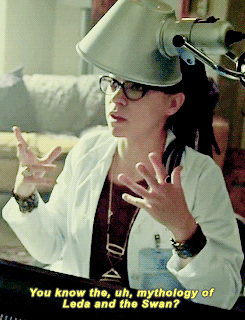CATCH OF THE DAY: Aldous Huxley’s Brave New World may have inspired many parallels in Orphan Black, but the connections don’t stop there. Huxley, in addition to being a foundational figure for dystopian literature, was also a poet. In 1920, he published a collection of poems titled Leda. Yes, that’s right, the massive overarching Orphan Black origin project mystery not only shares a name with the Greek myth of Leda, but Huxley’s poetry as well. And it’s a beautiful connection.
CATCH OF THE DAY: Aldous Huxley’s Brave New World may have inspired many parallels in Orphan Black, but the connections don’t stop there. Huxley, in addition to being a foundational figure for dystopian literature, was also a poet. In 1920, he published a collection of poems titled Leda. Yes, that’s right, the massive overarching Orphan Black origin project mystery not only shares a name with the Greek myth of Leda, but Huxley’s poetry as well. And it’s a beautiful connection.
Just as there’s more to Orphan Black than cute lesbian scientists and Ukranians who love Jell-O, there’s a whole lot more to Huxley than soma and the World State.
Keen Orphan Black viewers have been on the lookout for the origins of Project Leda’s name from the start, and we’ve been guided straight to the original Greek myth of Leda and the Swan. The story tells of Zeus coming down to earth in the guise of a swan and raping a woman named Leda, resulting in the birth of several children, most notably the twins Helen and Clytemnestra.
|
|
That in mind, Huxley’s poetry collection, Leda, consists of an 18 page poem of the same name followed by about a dozen shorter pieces covering a variety of topics. The poem "Leda" is a retelling of the myth through a series of rhyming couplets.
A quick excerpt:
Of life itself, tense with expectancy.
And over her the swan shook slowly free
The folded glory of his wings, and made
A white-walled tent of soft and luminous shade
To be her veil and keep her from the shame
Of naked light and the sun's noonday flame.
Hushed lay the earth and the wide, careless sky.
Then one sharp sound, that might have been a cry
Of utmost pleasure or of utmost pain.
Broke sobbing forth, and all was still again.
Find yourself a full copy of that poem Clone Club, because it is good.

Besides the very obvious connection between the names of Aldous Leekie and Aldous Huxley, the phrase itself has its ties to Huxley. This proverb, while originating from the 1180 German epic poem Reinhart Fuchs, found new footing in the 20th century with Huxley’s poem "Ninth Philosopher’s Song." Huxley concludes the poem with:
Blood, as all men know, than water's thicker
But water's wider, thank the Lord, than blood.
Oh, and like I mentioned previously, that poem just so happens to be published as part of the Leda collection. Isn’t that neat?
 |
| () |
One of the prime underlying themes of Orphan Black is identity in relation to familial ties, biology, faith, and society. The very meaning of the phrase “blood is thicker than water” has historically been read in two polarizing ways: as genetics trumping society, and as the idea that the “blood of the covenant is thicker than the water of the womb," which suggests that societal bonds are more important than biology. Orphan Black ties into these themes no matter how you interpret the statement. Couple that with the Leda and Huxley connections, and you have the recipe for one of the smartest shows on television right now.

Melanie is a future cat lady, current university student, and fearless pilot of a lime green bicycle. She lives for the moments in buffet lines when she can lean over to the person next to her and say: "Wow, this cantaloupe sure looks MELONIE!"
Follow Melanie on .




No comments :
Post a Comment